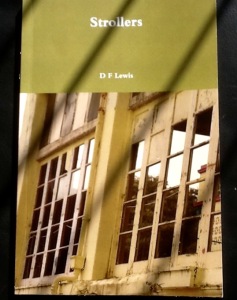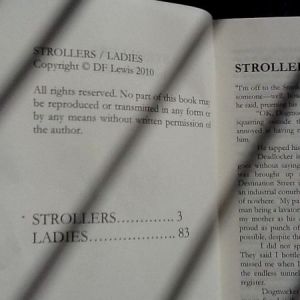LADIES

As a series of reflections upon my own six novellas continued from HERE, I shall now be concentrating on LADIES that was originally written in the early 1990s and later printed in this 2010 book…


My reflection on LADIES will be shown in the comment stream below…

Pages 83 – 93
After the rather mysteriously grim start of a young man in pain looking out of his window at a stylish lady standing on the pavement, we are plunged into something far more funny than I remember it. I started actually laughing out loud, as the members of the Ladies Group gossiped and backbit together, mixing uncouthness with snobbery and refinement, and there is talk of Dora’s husband George changing his sex and wanting to join the group. And a future trip to Brittany where they may have to go topless. Ms Ample Clavinty is a bit flat on top, anyway, we gather. She later writes a letter – to which we are privy – to an earlier member of the group who has moved away. This letter is genuinely a hoot and half. And what about Wanda Reack? Can’t believe I wrote this novella!
Ample’s correspondent, Agnes Tidy, replies with her own letter and she lets us read it, despite describing some very private moments with a husband called Dick! Later, we see her outside the letter talking to a rubbish bin that has got mixed up with a dream-like visitation from a delirious George who is having his sex change operation amid hospital visitors he sees as Angels. Inventions such as new curtain systems for privacy in hospital. Meanwhile, the Ladies Group members act in accordance with – and are mentioned in the same breath as – ‘premature senility’ and ‘running stitches’. If there is humour in all this it is now a very strange Joycean humour, but the characterisation is developing in an awkward but memorable way.
I am unquestionably impressed with this text. That sounds very immodest, but it isn’t, because I am now convinced that I did not (could not) write this female conspiracy to take men out of the equation by blending madness with sanity so that we cannot eventually differentiate one from the other. It has a sense of humour and a tentacular fluid style that I fail to recognise as mine. Not politically incorrect so much as deeply cruelly impolitely laid bare for correction. Muddying (literally!) the water of gender, orientation and social class. Hilarious, scatological, nightmarish and absurd at different times and sometimes together, with serious undercurrents. So, again, this work was not written by myself. Seriously. And, by the way, Ample’s letter of reply to Agnes in these pages is a classic of literature.
No change in my attitude to this work. Mind-boggled. I’ll just mention the recurring dreams: George’s dreams of angels and hospitals (btw, George has renamed himself Menorrhagia), the men in swimsuits getting on and off one of those old Ladies Only train carriages, and the man in his bedroom being watched by one of the ladies on the street outside. It all seems to blend when in context.
If I wrote this novella, which I severely doubt, then it is, with no doubt at all, my greatest work. Seriously. Why did I ever give up writing like that? Despite the disparate dreams, cruel conceits, wild jokes, it eventually becomes poignant (with the nature of Dame Floerence’s communion with the Scapegoat and much else), and it’s pre-emptive of the way the world has gone since it was written. The last scene on the train is matchless.
end